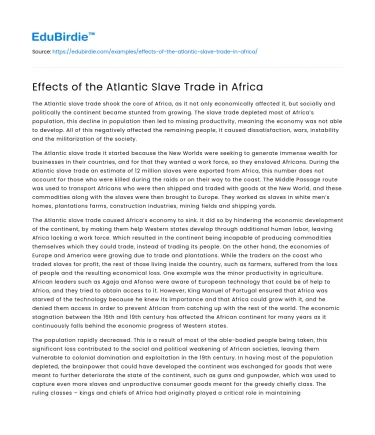The Atlantic slave trade shook the core of Africa, as it not only economically affected it, but socially and politically the continent became stunted from growing. The slave trade depleted most of Africa’s population, this decline in population then led to missing productivity, meaning the economy was not able to develop. All of this negatively affected the remaining people, it caused dissatisfaction, wars, instability and the militarization of the society.
The Atlantic slave trade it started because the New Worlds were seeking to generate immense wealth for businesses in their countries, and for that they wanted a work force, so they enslaved Africans. During the Atlantic slave trade an estimate of 12 million slaves were exported from Africa, this number does not account for those who were killed during the raids or on their way to the coast. The Middle Passage route was used to transport Africans who were then shipped and traded with goods at the New World, and these commodities along with the slaves were then brought to Europe. They worked as slaves in white men’s homes, plantations farms, construction industries, mining fields and shipping yards.
Save your time!
We can take care of your essay
- Proper editing and formatting
- Free revision, title page, and bibliography
- Flexible prices and money-back guarantee
The Atlantic slave trade caused Africa’s economy to sink. It did so by hindering the economic development of the continent, by making them help Western states develop through additional human labor, leaving Africa lacking a work force. Which resulted in the continent being incapable of producing commodities themselves which they could trade, instead of trading its people. On the other hand, the economies of Europe and America were growing due to trade and plantations. While the traders on the coast who traded slaves for profit, the rest of those living inside the country, such as farmers, suffered from the loss of people and the resulting economical loss. One example was the minor productivity in agriculture. African leaders such as Agaja and Afonso were aware of European technology that could be of help to Africa, and they tried to obtain access to it. However, King Manuel of Portugal ensured that Africa was starved of the technology because he knew its importance and that Africa could grow with it, and he denied them access in order to prevent African from catching up with the rest of the world. The economic stagnation between the 16th and 19th century has affected the African continent for many years as it continuously falls behind the economic progress of Western states.
The population rapidly decreased. This is a result of most of the able-bodied people being taken, this significant loss contributed to the social and political weakening of African societies, leaving them vulnerable to colonial domination and exploitation in the 19th century. In having most of the population depleted, the brainpower that could have developed the continent was exchanged for goods that were meant to further deteriorate the state of the continent, such as guns and gunpowder, which was used to capture even more slaves and unproductive consumer goods meant for the greedy chiefly class. The ruling classes – kings and chiefs of Africa had originally played a critical role in maintaining the stability of their domestic economies. However, with the introduction of slave trade and its continuous growth, social stability declined as some leaders abandoned themselves to purely militaristic and exploitative activities. They saw this as the only manner to ensure the safety of their families. This divided the society and caused violence to spread.
The Atlantic slave trade negatively affected the political landscape of Africa. Politically, there was fragmentation as due to leaders willingly partaking in the slave trade. This caused mistrust and division amongst the people of Africa. People had individual interests. Politically, wars would occur as rival African leaders would organize slave-raids because they are competing for control of slave-capture and to dominate trade routes, and ports. However, at a higher level, the was dense political fragmentation due to many small centralized states and secret societies which governed people. Therefore, making it difficult to develop methods of government that could effectively resist the impact of the slave trade and unite people. Internally, there was also a politico-religious struggle, which then resulted in wars. Africa’s political landscape had also changed because the people who were given the duty to administer the law were now a “warrior class whose sole purpose was slave-raiding” (Inikori and Engerman, pp.23-26). Due to the political fragmentation and wars, slave raiding and the ransoming of others became a daily occurrence. Secret societies used enslavement within Africa itself, by working against the freeing of captives, and displaced children – as a result of their parents either being sold or ending up dead, these groups could easily end up in the slave trade. These acts accounted for the massive enslavement of a majority of Africans being shipped to Europe. All in the interest of personal gain for the commercial elites.
The foreign invasion of Africa began with the Atlantic slave trade, which then caused a chain-reaction that negatively impacted Africa by disrupting its growth. This casual chain evoked by the slave trade meant the loss of people and in turn the loss of a work force for Africa; it proves that the slave trades effects are still visible in particular to the continuous poverty and underdevelopment of the continent. In losing people, minerals, raw materials and being incapable to internally and internationally trade prevented the continent from developing markets and technologically advancing. The Atlantic slave trade took away what Africa could have been if it had the opportunity to grow in its own manner.






 Stuck on your essay?
Stuck on your essay?

